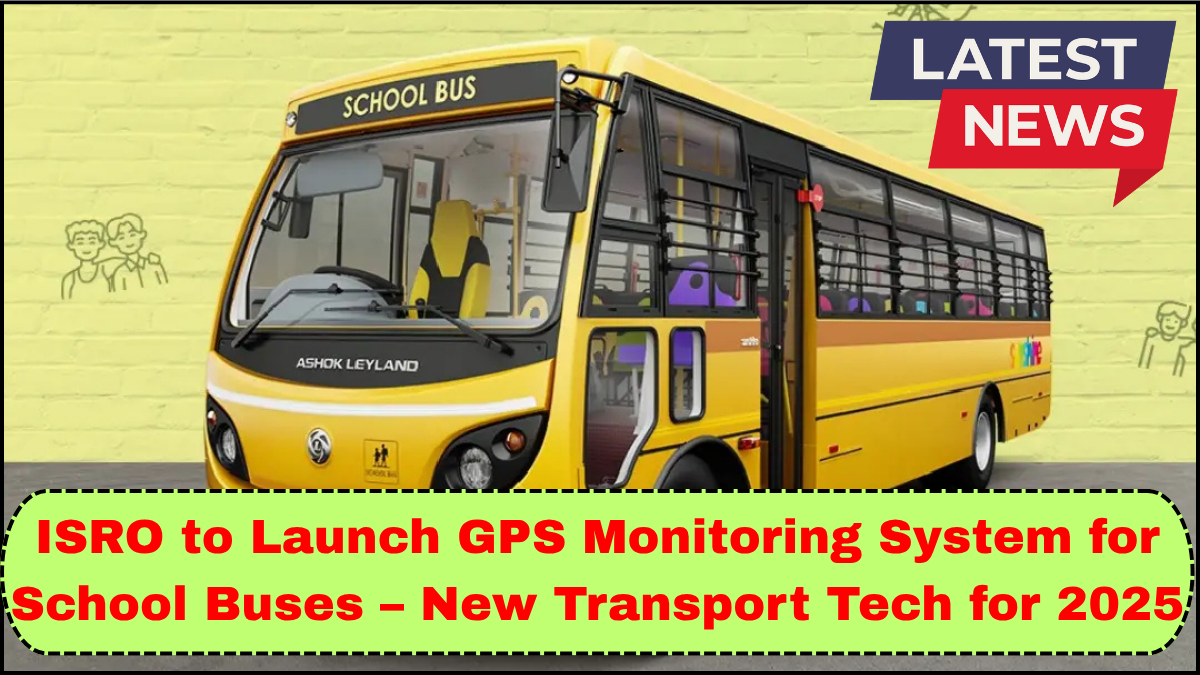India is set to take a major leap in student safety with the Indian Space Research Organisation (ISRO) announcing plans to roll out a GPS-based monitoring system for school buses by 2025. This initiative is a landmark moment in the evolution of student transport monitoring and highlights how space technology can be applied to everyday civilian needs.

A Game-Changer for School Transport Safety
The upcoming launch of this GPS tracking system for school buses by ISRO is designed to significantly improve safety standards in student transportation across India. Leveraging ISRO’s NavIC (Navigation with Indian Constellation) satellite network, this initiative will provide highly accurate real-time tracking of school buses. The move aligns with broader national goals of modernizing transport infrastructure and prioritizing child safety.
Unlike generic GPS systems that rely on international satellites, ISRO’s indigenous NavIC system offers better regional accuracy and performance, especially in urban and semi-urban areas where signal loss is common. With this technology embedded in school buses, schools and parents will gain precise data on vehicle routes, speed, unscheduled stops, and estimated time of arrival.
Real-Time Alerts and Parent Integration
One of the key innovations in ISRO’s system will be real-time alert integration. Parents and school administrators will receive notifications via mobile apps or web dashboards whenever buses deviate from their assigned routes or face unexpected delays. This empowers parents with peace of mind and provides schools with the tools to act promptly in case of emergencies.
The system will also include geofencing features. For example, if a bus enters or exits pre-defined zones such as school premises or pickup points, alerts will be triggered immediately. This level of oversight ensures no child is left behind or dropped off in an unsafe location.
Strengthening Compliance and Accountability
Beyond safety, ISRO’s GPS tracking initiative aims to promote accountability among transport providers. With digital trip logs, speed analysis, and driver behavior tracking, school authorities can ensure that drivers follow traffic laws and avoid rash driving or unscheduled detours. In case of any incident, historical data can be retrieved to support investigations or insurance claims.
Moreover, this initiative could push states to mandate GPS tracking in all school transport vehicles. Some urban municipalities already require basic tracking, but ISRO’s system sets a new benchmark in precision and reliability.
Technological Edge with NavIC
ISRO’s decision to base this project on the NavIC system offers a critical technological edge. NavIC is not only more accurate than many foreign GPS services within the Indian subcontinent, but it is also less prone to disruptions. Additionally, it is tailored to Indian geography, making it particularly effective in rural and hilly terrains where student transport often lacks robust monitoring.
The system is expected to be compatible with both new and retrofitted buses, making it accessible for schools of various capacities. ISRO is also working with transport departments, private fleet operators, and ed-tech companies to ensure seamless integration.
Future-Proofing Student Transport
By 2025, student mobility in India will likely see a significant upgrade. The ISRO-led GPS initiative isn’t just about tracking locations—it’s about building a future-ready student transport monitoring ecosystem that prioritizes safety, transparency, and efficiency.
With the increasing concerns around child safety, especially in public and private transport, this system could become a gold standard, encouraging similar initiatives across other sectors such as public buses, ambulances, and freight logistics.
Frequently Asked Questions (FAQ)
Q1: What makes ISRO’s GPS tracking different from existing systems?
ISRO’s system uses NavIC, an India-developed satellite navigation system, offering better accuracy and reliability within the country compared to global GPS systems.
Q2: Will parents have access to real-time updates?
Yes, parents will receive real-time alerts and tracking data through integrated mobile apps.
Q3: Is the system mandatory for all school buses?
While not yet mandatory nationwide, the system is expected to become a recommended or required standard in the near future as part of school safety regulations.
Q4: Can this system work in rural areas?
Yes, NavIC is specifically designed for better coverage and signal strength in rural and semi-urban areas of India.
Q5: When will the rollout begin?
The GPS tracking system is expected to begin deployment in 2025, starting with pilot programs in selected cities and states.
click here to learn more